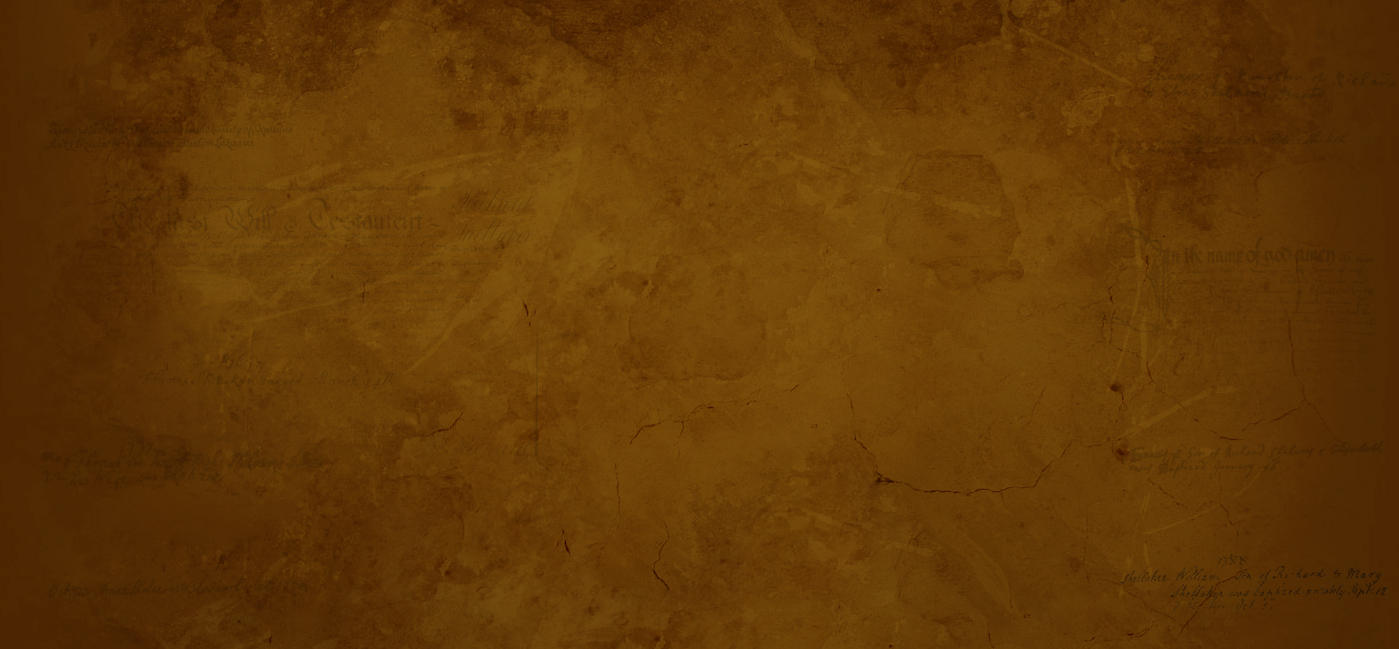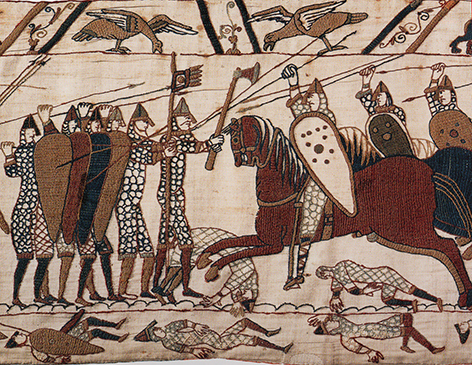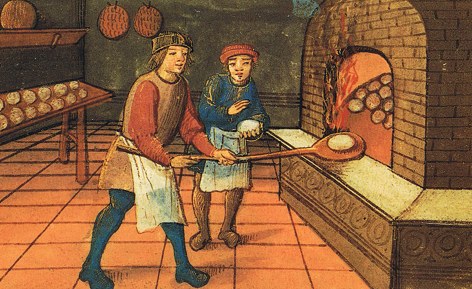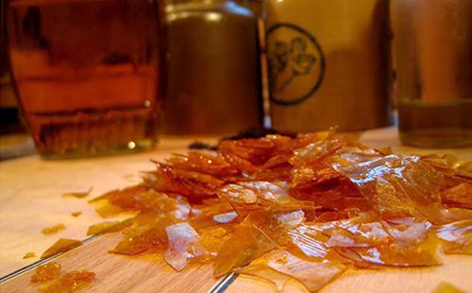

Surnames are relatively new in our country. Before the Norman Conquest of 1066, people did not have hereditary surnames: they were known just by a personal name or nickname. This was because villages and hamlet were so small each person could be identifiable by a single name.
However as the population increased, it gradually became necessary to identify people in more detail. This lead to names such as ‘John the butcher’, ‘William the short’, ‘Henry from Sutton’, ‘Mary of the wood’, ‘Roger son of Richard’. Over the decade many of these types of names became altered, often by inconsistencies passed on verbally, and their original meaning is now not as evident as it once was.
THE ARRIVAL OF THE NORMANS
 After 1066, Norman barons introduced surnames into England and the practice gradually spread around the country.
After 1066, Norman barons introduced surnames into England and the practice gradually spread around the country.
Initially, the identifying names were changed or dropped but some eventually they began to stick and to get passed on. So trades, nicknames, places of origin, and fathers’ names became fixed surnames – names such as Fletcher and Smith, Redhead and Swift, Green and Pickering, Wilkins and Johnson.
By 1400 most English families, and those from Lowland Scotland, had adopted the use of hereditary surnames. Most Saxon and early Celtic personal names – names such Oslaf, Oslac, Oswald, Oswin and Osway (‘Os’ meaning God) – disappeared quite quickly after the Norman invasion. It was not fashionable, and possibly not sensible either, to bear Saxon names during those times, so they fell out of use and were not often passed on as surnames.
New surnames continued to be formed long after 1400, and immigrants brought in new ones. It is important to remember that both surnames and forenames are subject to variations in spelling, and not only in the distant past. We see our own family name spelt as ‘Shellaker, ‘Shellakers’, ‘Shillakars’, ‘Shilakers’ , ‘Shellacres’ and ‘Shelacre’. Standardised spelling did not really arrive until the 19th century.
There are perhaps 45,000 different English surnames, each one with a history behind it, but most had their origins as one of these six main types.
Occupational
Describing a personal characteristic
From a geographical feature of the landscape
Baptismal names – those that come from a male given name or a female given name or ancestral – signifying patronage.
From the name of an estate
From an English place name
I will go through these options individually to explain how such surnames derive and consider each type as an option behind the surname ‘Shelacre / Shellaker’.
And I will then put forward my own, as yet unproven theory, as to which of these types of surname which I consider to be the the most probable as being the origin of our family name…….
 Occupational names are relatively common and easy to understand, as they identify people based on their job, trade or their position in society.
Occupational names are relatively common and easy to understand, as they identify people based on their job, trade or their position in society.
If a man was called, for example, “Richard Baker”, it indicated he baked bread for a living and because sons very often followed their father’s occupation the surname continued across generations, even when baking bread was no longer the trade of that person.
Some occupational surnames are very obvious e.g. Carpenter, Smith, Potter, Cooper, Mason, Tailor or Taylor, Spinner, Weaver, Dyer, Thatcher, Tyler, Slater, Miller, Baker, Cheeseman, Spicer, Cook, Fisher, Shepherd, Carter, Clarke, Skinner and Gardener.
Some occupational names are not so obvious; a sawyer was a man who sawed logs, a turner was a man who turned wood on a lathe and made things like wooden bowls and a roper made ropes.
Likewise a mercer was a dealer in fine cloth, a bowyer made bows and a stringer or stringfellow made the strings for bows while a fletcher made the shafts for arrows and attached the flights.
Could ‘Shellaker‘, ‘Shelacres‘ or any of its other derivatives, be an ‘OCCUPATIONAL SURNAME’?
There is a substance named ‘Shellac‘, which is is a resin secreted by the female lac bug, on trees in the forests of India and Thailand. The substance has been in use for centuries – there is written evidence to show shellac goes back 3,000 years.
 It has many uses, it is used as a wood finish in the western europe, it is an element of the traditional “French polish” method of finishing furniture. However the uses of ‘Shellac’ are incredibly obscure and diverse; dental technology, a binder in Indian Ink, it adds shine to Citrus fruit, it is used in the process of making woodwind instruments, ballet shoes, in the watchmaking process, firework, jelly beans and it is used as a nail treatment.
It has many uses, it is used as a wood finish in the western europe, it is an element of the traditional “French polish” method of finishing furniture. However the uses of ‘Shellac’ are incredibly obscure and diverse; dental technology, a binder in Indian Ink, it adds shine to Citrus fruit, it is used in the process of making woodwind instruments, ballet shoes, in the watchmaking process, firework, jelly beans and it is used as a nail treatment.
So could someone who works with Shellac have become known as a ‘Shellac-ker’?
I think that idea is very doubtful. People who use Shellac on wood are known as ‘French polishers’ and many centuries ago they were known as ‘varnishers’.
Because the uses of Shellac are so diverse, and I’ve listed only a few uses, it is used by many different trades – there was not a occupation who solely used this material. Consequently I think an ‘occupational‘ reason, based upon the use of Shellac, as being the origin of the name Shellaker is extremely improbable.
Some surnames had their origins based on nicknames that described the person. These include those used to describe the height of a person such as ‘Short’, ‘Long’ and ‘Little‘. Example of this type of name include colouring, skin or hair or perhaps clothing; ‘Black’, ‘White’, ‘Green’ and ‘Red‘ or another characteristic trait of the person; ‘Stern’, ‘Strong’ and ‘Swift‘.
Could a personal characteristic, such as the type mentioned above, be the origin of the surname ‘Shellaker‘?
Try as I might I cannot think how it could be so. Consequently I think a ‘physical or personal characteristic’ of one of our ancestors as being the origin of the name Shellaker is extremely implausible.
Next Page: Other options are considered